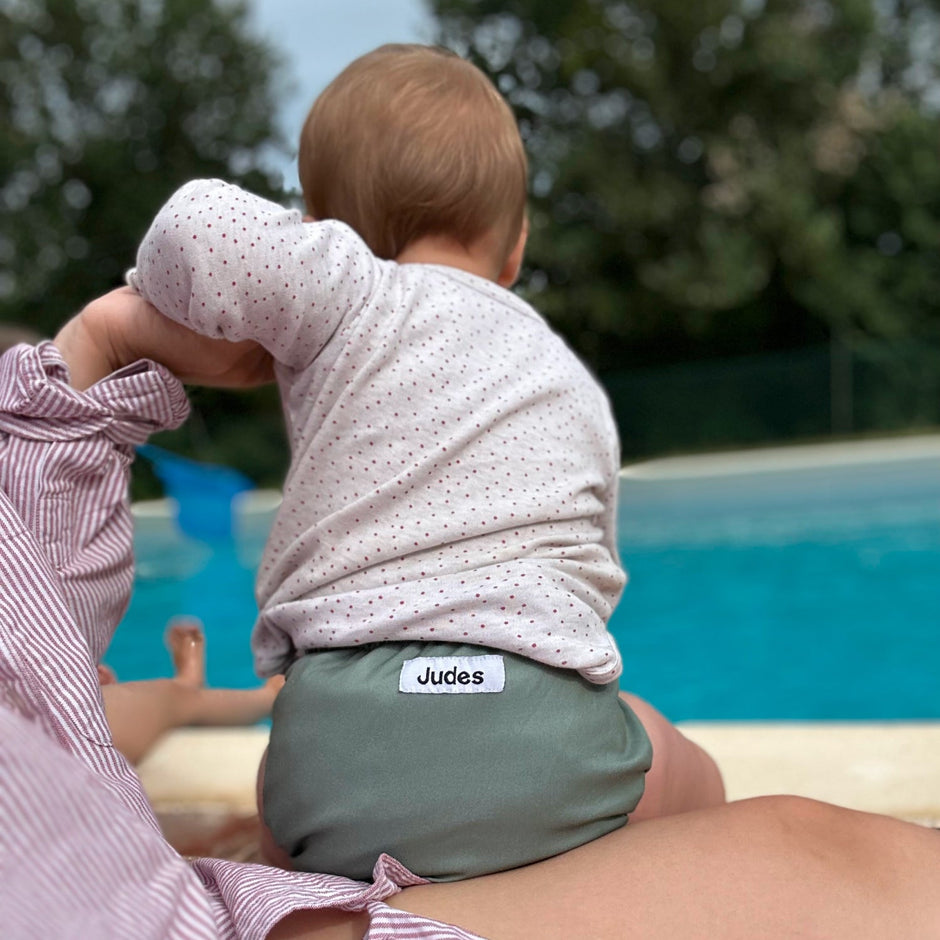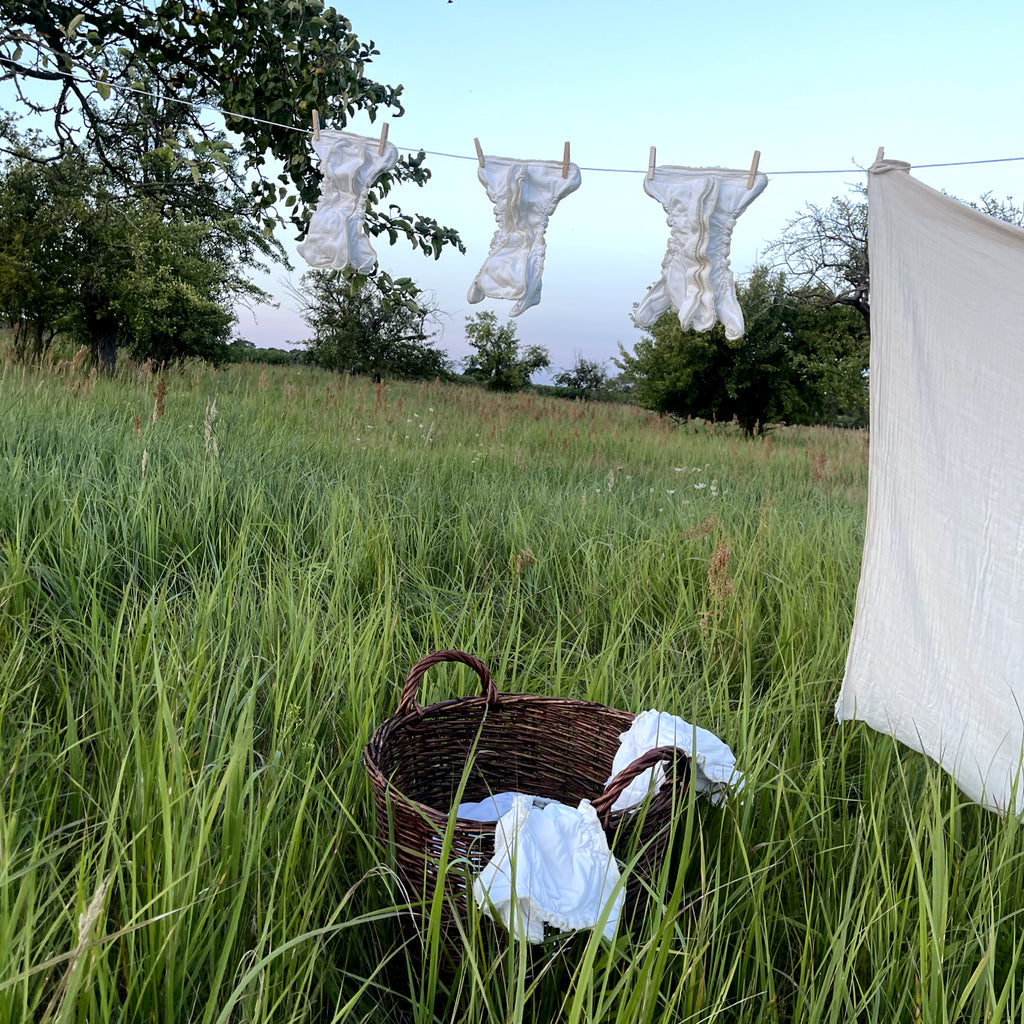The Conscious Choice: Diapers or Pants
Updated on:
Photo by @cafema.illustration
Diapers or pants – this question can quickly become a challenge when it comes to your baby's well-being. Both options have their advantages, but which is truly the best choice for your little one and our planet?
Which is better - diapers or pants? The question of whether diapers or pants are better depends greatly on your child's individual needs and your lifestyle. Diapers are especially practical for newborns and small babies, while pants are an ideal choice for active toddlers and children who are learning to use the toilet. However, both diapers and pants, in their disposable versions, are less environmentally friendly than cloth diapers, which offer a more sustainable and often gentler alternative for your baby's skin.
Before we dive deeper into this discussion, let's take a look at the fundamental differences between diapers and pants – and why we might have an even better alternative for you.
Diapers or Pants – What’s the Difference?
Diapers or pants – there are many different of options, and sometimes the choice can be overwhelming. Before you make a decision, it’s important to know the differences.
Both disposable and cloth diapers, are the classic companion for newborns and small children. They are made from absorbent materials that soak up moisture, keeping your baby’s skin dry and their clothes clean. Diapers are available in a range of sizes and, thanks to their adjustable fasteners, can be adjusted fit your baby perfectly.
Pants, also known as training pants, are a more modern option and provide a practical solution especially for active toddlers. They are designed to be pulled up and down like regular underwear, making them the ideal choice for children who are on the path to potty training.
But what are the advantages of diapers and pants, and what role do cloth diapers play in this discussion?
Advantages of Diapers
Disposable diapers have been a staple in many households for decades. Thanks to their practicality and ease of use, they have secured a place in the hearts of many parents. Here are some of the reasons why parents opt for the conventional diaper option:
- Convenience: One of the main arguments for diapers is their simplicity. They are quick to put on, easy to change, and do not need to be cleaned after use. They’re practical for on the go or when you simply don’t have time for laundry.
- Leak Protection: Thanks to their superabsorbent technology, disposable diapers can absorb large amounts of liquid, reducing the risk of leaks and wet baby clothes.
- Adaptability: Most brands offer a variety of sizes and designs to ensure the diaper fits perfectly.
- Availability: Diapers are available in almost every supermarket and many online shops, which makes the purchasing process uncomplicated.
Despite these advantages, there are also disadvantages that we should consider. Below, we have summarized the main pros and cons of pants.

Photo by @cafema.illustration
Advantages of Pants
Pants, also called diaper pants or training pants, have proven to be a good solution for active toddlers and their busy parents. They are a comfortable, practical solution, especially for children who are already on their way to being potty trained. Here are some of the advantages that pants offer:
- Easy to use: Pants are like underwear and can be pulled up and down by your child. This makes going to the toilet easier and encourages your child's independence.
- Comfort and freedom of movement: Thanks to their elastic waistband and flexible fit, pants allow your child unrestricted freedom of movement. They are ideal for active toddlers who are constantly on the move.
- Discreet and unobtrusive: Pants look like regular underwear and can therefore be worn discreetly under clothing. They are a good choice for older children who may feel "too old" for diapers.
- Absorbent: Despite their similarity to underwear, pants are very absorbent. They protect your child from leaks just as well as conventional diapers.
Despite these advantages, we must not overlook the disadvantages here either. As with disposable diapers, it is important to consider their impact on the environment.
Disadvantages of Diapers and Pants – A Look at Sustainability
Despite their practical advantages, disposable diapers and pants also have disadvantages. The main concerns lie in their impact on the environment and on children's health.
- Environmental impact: Every disposable diaper and set of pants produced contribute to waste generation and, therefore, to environmental pollution. It is estimated that a single disposable diaper can take up to 500 years to fully decompose. This ever-growing mountain of waste is a tremendous burden on our planet.
- Longer diapering: The use of diapers and pants ensures that the diapering phase lasts longer and increases the cost of diapers unnecessarily. The constant feeling of dryness slows the child's development. Cloth diapers, on the other hand, provide children with wetness feedback, helping them better understand their body's processes. Children who wear cloth diapers become potty trained much earlier. Every 6th child who wears disposable diapers still needs a diaper until their fourth birthday or longer, whereas cloth diapered children often show first signs of dryness as early as 1.5 years old.
- Health concerns: Some parents — with good reason — have concerns about the chemicals used in disposable diapers and pants. These can cause skin irritation or allergic reactions in some children.
- Cost: Although individual disposable diapers and pants seem inexpensive, costs add up over time. Over two to three years, they can amount to a substantial sum.
All these points lead us to a more sustainable and environmentally friendly solution – cloth diapers. They are not only gentle on your baby's skin but also on the environment. Let's learn more about this conscious choice.

Photo by @kerstinbrigitteposch
Why Cloth Diapers? – The Sustainable Alternative
In an era of sustainability and conscious consumption, cloth diapers are regaining their importance. They are an eco-friendly, healthy, and cost-effective alternative to conventional disposable diapers and pants. But why are cloth diapers a better choice?
- Sustainability: In contrast to disposables, cloth diapers produce less waste and use fewer resources. A single cloth diaper can be washed and reused hundreds of times, making it a more environmentally friendly choice.
- Health and comfort: Cloth diapers are free from chemicals and therefore less likely to cause skin irritation and allergies. They are usually made from natural materials such as cotton, which are breathable and soft on your baby's sensitive skin.
- Cost effective: Although the initial cost of cloth diapers can be higher, in the long run, they are cheaper. You can reuse them again and again, so you save money over time.
- Earlier potty training: Thanks to the natural wetness feedback provided by cloth diapers, your child better understands their bodily processes earlier on and learns faster how to control them. This results in cloth-diapered children becoming potty trained much earlier.
- Better leak protection: While disposables can store a lot of liquid, they often cannot absorb it quickly enough. Especially with heavy wetters or explosive breastfed stools, accidents are practically inevitable. The natural materials in cloth diapers, however, absorb liquid quickly and securely, making them much more leak-proof.
With all these advantages, cloth diapers are an attractive alternative to disposable diapers and pants.
Judes – A Cloth Diaper as Simple as a Disposable Diaper
The variety of different cloth diaper systems and inserts can appear very confusing at first glance. For this reason, we at Judes have set ourselves the goal of developing a cloth diaper that is at least as easy to use as a disposable diaper. Many parents already attest that we have succeeded in this, and Judes are even easier to use than conventional diapers.
Our system consists of only two parts: a soft and absorbent inner diaper and a waterproof diaper cover. Our practical diaper bag completes the set.
Changing diapers with Judes works as follows:
- Lay your child on a suitable surface, open the velcro fasteners, and remove the diaper. You can hang up the cover to air out and reuse it later; place the inner diaper into the diaper bag.
- Clean your child’s intimate area – our washcloths are especially gentle on the skin for this purpose.
- Now first put on the inner diaper, then the outer cover, and close the hook-and-loop fasteners so that there’s still enough room for two fingers between the diaper and the belly. Check that the leg cuffs are sitting correctly — and your child is ready for their next adventure.
Advantages of Judes – More Than Just Environmental Protection
Our cloth diapers are more than just an eco-friendly alternative. They come with a range of additional benefits that make them an excellent choice for conscious parents. Here are some of the extra advantages of cloth diapers:
- Gentle on baby’s skin: Cloth diapers are made from natural, breathable materials like cotton that are less likely to cause skin irritation and are generally healthier than disposable diapers. They are free from chemicals, fragrances, and plastics found in disposable diapers and pants.
- Adaptability: Cloth diapers offer a variety of adjustment options. They come in different sizes and designs, so you can find the perfect fit for your child. Our Judes can be perfectly adapted to your child’s body with hook-and-loop fasteners. Cuffs on the legs and back further ensure a leak-proof and optimum fit.
- Fewer leaks: Thanks to their high absorbency and good fit, cloth diapers often have fewer leak problems than their disposable counterparts.
- Aesthetically pleasing: With cloth diapers, you can express your personal style. They are available in a wide variety of colors, patterns, and styles — far beyond classic white.
- Earlier potty training: There is evidence that children who wear cloth diapers often become potty trained earlier. This is because they sense the feeling of wetness more readily and thus learn more quickly the connection between elimination and discomfort. The results of our study on this topic are clear.
With all these advantages, it’s easy to understand why more and more parents are turning to cloth diapers. They are a conscious, healthy, and eco-friendly alternative to traditional disposable diapers and pants.
If you’re still unsure, we have the perfect solution: Give it a try with our Starter Set or use our rental package to test Judes for yourself.

